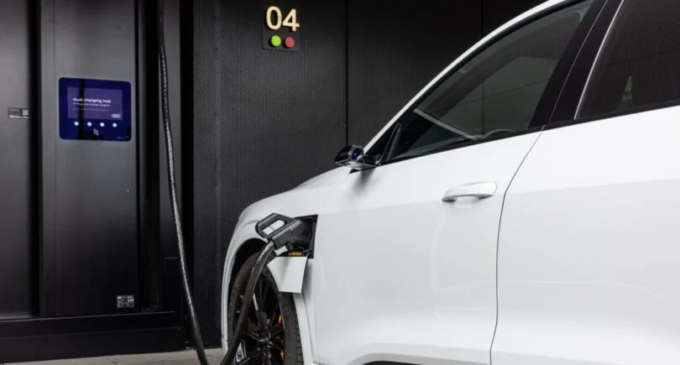One of the biggest obstacles to the widespread acceptance of electric vehicles is the lack of charging points. Not everyone has their own garage where they can install such a charging point themselves, and even in large cities there are far too few charging points available in public spaces per thousand e-cars. Audi is trying to counteract this with its own concept – similar to Tesla, but in cities instead of highways.
With the Audi charging hub, the car manufacturer is primarily serving drivers who do not have the option of charging at home in an urban environment. Following a pilot project in Nuremberg, a second compact pilot of the Audi charging hub will now open in Zurich in the second half of the year, followed by locations in Salzburg and Berlin. Further locations are planned for 2023 and mid-2024, initially in Germany.
Audi registered around 3,100 charging processes from January to the end of April 2022 at the Nuremberg site during the pilot phase of the world’s first fast-charging station with six reservable high-power charging slots; on average, that’s 24 charging processes with around 800 kWh per day. On average, 35 customers visited the 200-square-meter lounge every day. The convenient charging experience, which can be reserved via an app and includes a lounge and catering, has been very well received by users, the car manufacturer reports. The charging stations are comfortably designed and feature a swivel arm for the heavy cables and plugs, roofing, lounge and concierge. “The numbers and the positive customer feedback show that our concept of offering a flexible and premium fast-charging infrastructure in urban areas has worked,” says Ralph Hollmig, project manager for the Audi charging hub. As a service offering, the charging hub holds, among other things, battery packs for micromobility.
The cubes not only serve to charge the vehicles, but also as energy storage units. Used lithium-ion batteries, which come from dismantled Audi test vehicles, act as power storage units. The Audi charging hub is thus intended to bring a sustainable fast-charging infrastructure via the battery storage solution to places where the power grid would not be sufficient for this, in order to operate six HPC charging points with up to 320 kW. Thanks to the 2.45 MWh intermediate storage, the pilot site in Nuremberg only needs a 200 kW connection to the low-voltage grid to continuously fill the storage modules. Nevertheless, up to six e-cars can be charged simultaneously with around 1 MW. Photovoltaic modules on the roof additionally provide up to 30 kW of green energy.
Based on the findings and feedback from customers in Nuremberg, Audi now plans to open another variant of the Audi charging hub construction kit with four covered charging points at two power cubes in Zurich in the second half of the year. The smaller footprint of the components is tailor-made for urban locations. Further advantages: The lead times for planning and implementation are short, and civil engineering measures are not required. A key component of the variable and compact concept is the swivel arm, which has been modified again in comparison and allows cars to be charged barrier-free with up to 320 kW across the entire width of the individual parking spaces. The operating displays at the charging points are height-adjustable and the paths between the Cube and the vehicle are sufficiently wide for wheelchair users.
After Zurich, Audi is planning further locations for its charging hub in the second half of 2022. Two compact versions similar to the Zurich facility will then be built in Berlin and Salzburg. Three further locations in German cities are to help meet the increased demand for charging, especially in urban areas, in 2023. Audi also plans to open additional hubs in German cities by mid-2024.



Leave a comment